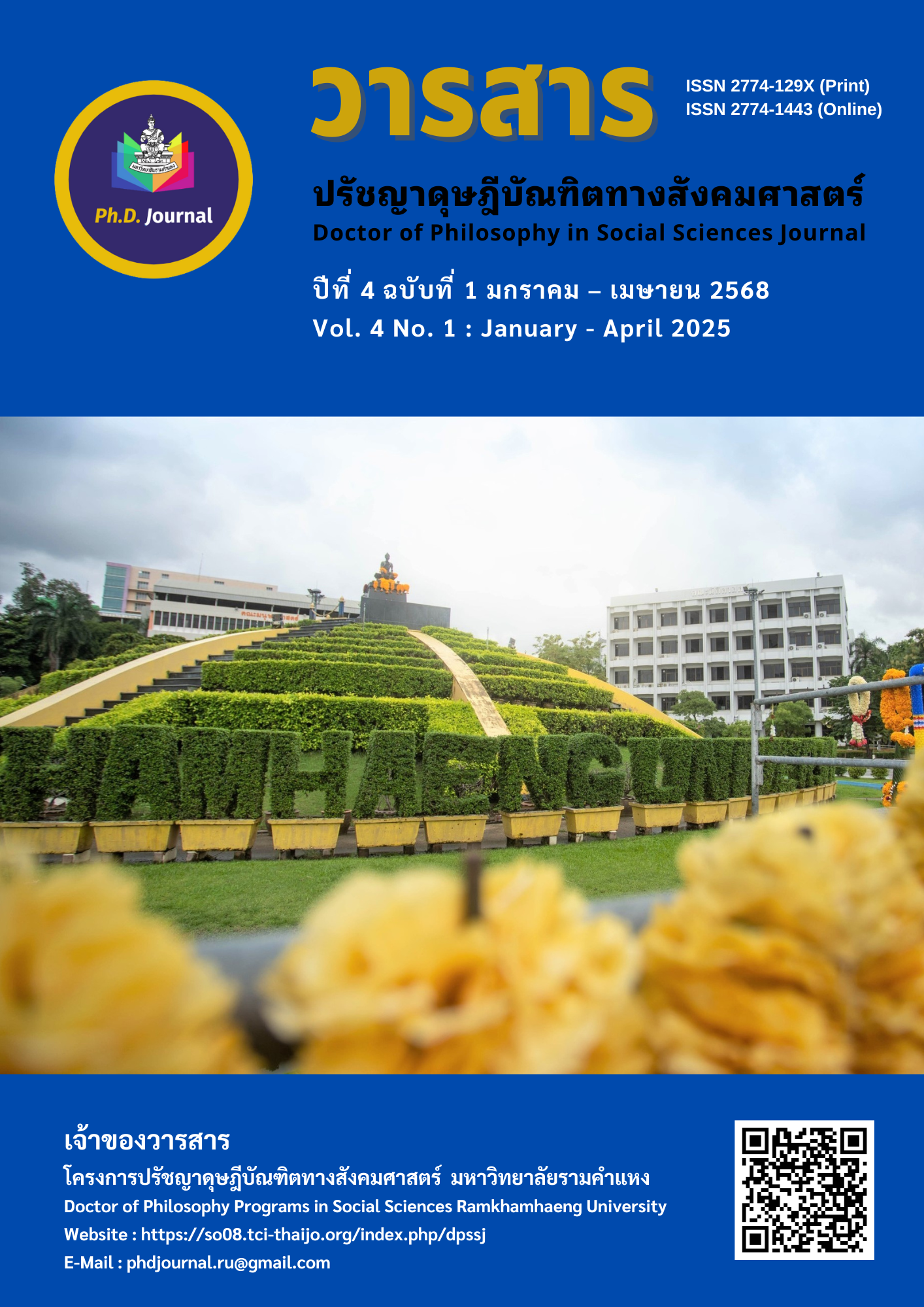A Model for Managing and Developing Small Schools Through a Mentoring Process to Enhance Teachers' Integrated Teaching Efficiency and Develop Analytical Thinking Skills of Primary School Students in Phetchaburi Province
Keywords:
Small school, Mentor school, Integrated teaching and learning management, Analytical thinking skillsAbstract
This research aimed to develop and examine the effects of a management and development model for small schools utilizing the mentor school approach. The objective was to enhance the effectiveness of integrated teaching and learning management among teachers, as well as to improve analytical thinking skills among primary school students in Phetchaburi Province. The study employed an action research methodology and was conducted in six phases as follows: 1. Document analysis and in-depth interviews with school administrators, teachers, and school board members of the targeted scolls to assess the current state and challenges of managing small schools through a mentoring process and to establish a conceptual framework for developing the model. 2. Model development through focus group discussions with experts to refine the management and development model. 3. Model evaluation by collecting feedback through questionnaires from the expert group to assess the model appropriateness. 4. Model implementation by applying the developed model in the targeted schools. 5. Evaluation of integrated teaching management after the model implementation, performed by experts and mentor teachers. 6. Evaluation of students' analytical thinking skills after the model implementation among primary school students in Phetchaburi Province.
The research findings are as follows:
1.The developed model for managing and developing small schools through a mentoring process to improve teachers' integrated teaching efficiency and enhance the analytical thinking skills of primary school students in Phetchaburi Province was found to be highly effective. The model's administrative processes were clearly defined and included the following components: 1. Stakeholders involved e.g. 1) School board members 2) Parents 3)Teachers and educational personnel. 2. Administrative processes e.g.: 1) Planning 2) Decision-making 3) Implementation 4) Evaluation 5) Benefit realization. 3. Relevant tasks/areas e.g. 1) Academic Affairs 2) Personnel Affairs 3) General Administration. The model aimed to enhance teachers' ability to perform integrated teaching and improve students' analytical thinking skills. The overall evaluation of the model by experts indicated that it was highly appropriate, with a mean score of 4.55 (SD = 0.42).
2. The evaluation of integrated teaching management after implementing the developed model in Ban Bang Ket School, conducted by experts and mentor teachers, was rated as excellent.
3. The assessment of students' analytical thinking skills after implementing the model showed an average score of 16.33 out of 20, equivalent to 81.67 per cent.
References
กระทรวงศึกษาธิการ. (2543). กลวิธีการจัดการเรียนการสอนที่สอดคล้องกับวิธีเรียน. กองวิจัยการศึกษา กรมวิชาการ กระทรวงศึกษาธิการ.
กระทรวงศึกษาธิการ. (2546). พระราชบัญญัติการศึกษาแห่งชาติ พ.ศ.2542 และที่แก้ไขเพิ่มเติม (ฉบับที่ 2) พ.ศ.2545 และพระราชบัญญัติการศึกษาภาคบังคับ พ.ศ.2545. กระทรวงศึกษาธิการ.
กิตติ บุญปรุงและพชรวิทย์ จันทร์ศิริสิร. (2560). การพัฒนาแนวทางการนิเทศแบบสอนแนะสำหรับครูคณิตศาสตร์ของสถานศึกษา สังกัดสำนักงานเขตพื้นที่การศึกษามัธยมศึกษา เขต 21. วารสารการบริหารและนิเทศการศึกษา, 8(1), 107-115.
ไกรยส ภัทราวาท. (2562). ผลวิจัยชี้ชัด การศึกษาปฐมวัย เพิ่มคุณภาพ-ลดเหลื่อมล้ำการศึกษา. https://www.thansettakij.com/general-news/416285.
ณัฐวุฒิ กิจรุ่งเรือง, วัชรินทร์ เสถียรยานนท์และวัชนีย์ เชาว์ดำรงค์. (2545). ผู้เรียนเป็นสำคัญและการเขียนแผนจัดการเรียนรู้ของครูมืออาชีพ. สถาพรบุ๊คส์
ธีระพงษ์ สืบโสดา. (2558). ปัญหาและแนวทางการพัฒนาการบริหารงานวิชาการของโรงเรียนเบญจมราชูทิศ จังหวัดจันทบุรี สังกัดสำนักงานเขตพื้นที่การศึกษามัธยมศึกษา เขต 17. วิทยานิพนธ์ศึกษาศาสตรมหาบัณฑิต, มหาวิทยาลัยบูรพา.
นวรัตน์ ประทุมตา. (2568). รูปแบบการบริหารและพัฒนาโรงเรียนขนาดเล็กโดยใช้กระบวนการโรงเรียนพี่เลี้ยงเพื่อเพิ่มประสิทธิภาพในการจัดการเรียนการสอนแบบบูรณาการของครูผู้สอนและพัฒนาทักษะการคิดวิเคราะห์ของนักเรียนระดับชั้นประถมศึกษา จังหวัดเพชรบุรี. คณะครุศาสตร์ มหาวิทยาลัยราชภัฏเพชรบุรี
ล้วน สายยศ, และอังคณา สายยศ. (2539). เทคนิคการวัดผลการเรียนรู้. สุวีริยาสาส์น.
สมนึก ภัททิยธนี. (2551). การวัดผลการศึกษา (พิมพ์ครั้งที่ 6). ประสาน.
สถาบันทดสอบทางการศึกษาแห่งชาติ (องค์การมหาชน). (2557). ระเบียบสถาบันทดสอบทางการศึกษาแห่งชาติ (องค์การมหาชน) ว่าด้วยแนวทางปฏิบัติเกี่ยวกับการดำเนินการทดสอบ พ.ศ. 2557.
อภิชญา สังกะคาและธรินธร นามวรรณ. (2562). แนวทางการพัฒนาการบริหารวิชาการสู่การเป็นโรงเรียนคุณภาพ สังกัดสำนักงานเขตพื้นที่การศึกษาประถมศึกษากาฬสินธุ์ เขต 1. วารสารพุทธปรัชญาวิวัฒน์. 5(2), 86-99.
อารยา ยวงย้อยและดวงกมล ไตรวิจิตรคุณ. (2566). แนวทางพัฒนาการบริหารงานวิชาการของโรงเรียนบ้านคลองไทร. วารสาร มจร อุบลปริทรรศน์, 8(2), 1-15.
Bloom, B. S. (1956). Taxonomy of educational objectives: The classification of educational goals. Handbook I: Cognitive domain. David McKay.
Downloads
Published
Issue
Section
License
Copyright (c) 2025 Doctor of Philosophy in Social Sciences Journal

This work is licensed under a Creative Commons Attribution-NonCommercial-NoDerivatives 4.0 International License.



